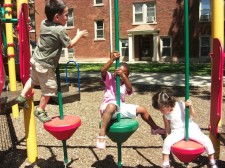 In today s issue of the Wall Street Journal, ACSH friend Lenore Skenazy (whose blog, "Free-range Kids" is not to be missed) and co-author Peter Gray discuss the educational importance of child s play and why missing out on playtime can hinder the development of valuable life skills.
In today s issue of the Wall Street Journal, ACSH friend Lenore Skenazy (whose blog, "Free-range Kids" is not to be missed) and co-author Peter Gray discuss the educational importance of child s play and why missing out on playtime can hinder the development of valuable life skills.
The authors point out that as children head back to school, we should be less concerned about them having forgotten lessons they learned last school year, and more concerned about the lack of time they will now have for free play playtime that is initiated and directed by children.
The article addresses several lessons that can be learned from play, and why these social and motivational skills cannot be learned from essay prompts and vocabulary tests.
For example, innovation and creativity are developed in free play. When children aren t being told what to do (as they most always are in classroom settings), they are pushed to use their imagination to make their own fun.
Cooperation and self-control are also learned in playtime. Children need to compromise to be sure all the players of the game are happy, and must learn not to throw temper tantrums when they don t win otherwise other players get upset and the game ends. This learned social proficiency can easily be applied throughout life especially in the workplace.
Motivational skills learned from play include learning to practice and managing difficult tasks. The authors point out that if the task is something they enjoy, like drawing or building blocks, then children don t mind working hard and focusing.
Skenazy and Gray conclude, Children s intense desire to play evolved because it serves so many educational purposes. It s the natural, joyful means of learning how to become smart, social, successful adults. When we substitute school and supervised activities for play time, it s like substituting a vitamin pill for real food.


